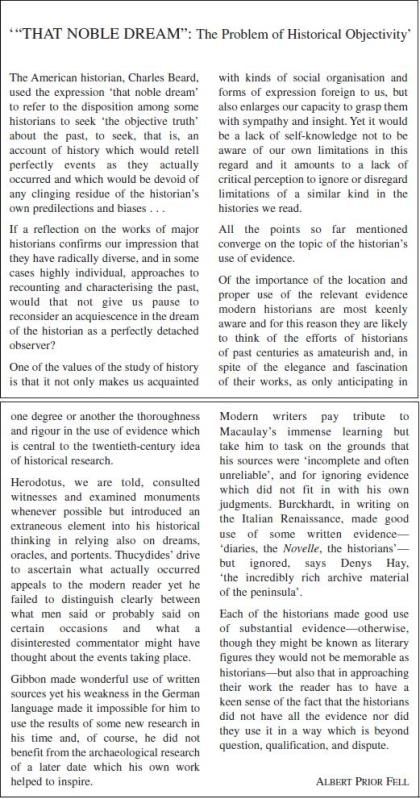For all the history nerds:

Question 1 (25 marks)
With reference to the Source and other sources, discuss how this interpretation of history
compares with your own view.
Albert Prior Fell examines in the source the issue of ‘that noble dream’ that he claims inspired many modern day historians to judge anachronistically the historians of the past. Although his passage ends on an admirable note, ‘they might be known as literary figures’, his argument ironically attempts to remain objective, and fails.
Fell makes a valid point: ‘modern historians are keenly aware’ that previous historians do not possess the skill of objectivity ‘which is central to the twentieth-century idea of historical research.’ It is common for historians to, at times anachronistically, judge one another. Fell speaks of these historians almost as if he is not one, but then slips into a critique of Herodotus and Thucydides, but then reverts to his previous exterior view, looking again at other historians. In closing by saying that ‘the reader has to have a keen sense’, Fell is suggesting we place ourselves in the position where it is fine to judge the historian, as long as we acknowledge the historian’s shortcoming. This interpretation of the historian as the reader of history blames the historians of the past for trying, and failing. While it’s important, as he says, to be aware of the fact ‘the historians did not have all the evidence, nor did they use it in a way which is beyond question, qualification and dispute’ (Fell). This awareness should not neglect to observe and curb their own bias and be grateful for at least some insight into the past.
Fell targets foremostly Herodotus, criticising his introduction of ‘an extraneous element’ to his history. Herodotus, named the ‘Father of History’, was the one of the first to write his history down. The very nature of evidence itself is disreputable, as Leopold von Ranke found out into his investigations. Fell criticises Herodotus for using ‘dreams, oracles and portents’. To the ancient Greeks, this evidence was as reliable as anything modern day historians would highly value, and the Greek historians such as Xenophon, Plutarch, Plato and Thucydides would not have recognised the unreliable nature of evidence because to them, there was no need to question the words of the gods. In their histories of the Persian Wars (490 - 479BC, Greece), especially the use of the Oracle, seemed to come to positive fruition. As mentioned, Leopold von Ranke in his own ‘noble dream’ (Beard) ‘wie es eightlich gewesen’ rejected the previous use of sources and it soon became apparent that even using ‘the most genuine and immediate documents’ (Ranke) could not remove the inherent bias. Criticising the use of available sources, especially concerning the ancient historians who did not have the sources modern historians have (eyewitness account from all over the world, written, recordings, photographic evidence) is not only anachronistic, but short-sighted. What Fell fails to mention in his critique of Herodotus is that modern historians should be thankful for the chance to examine such a source, pure Greek bias without the purposeful selection of less bias sources. This type of bias history is incredibly useful - it reveals much about the belief systems of the people and their political attitudes. Juxtaposed, for instances, with a Persian source, the two sources compliment and contradict simultaneously, a mor useful occurrence than an ‘objective’ piece of writing by a historian rejecting any information that is negligible.
I is unlikely that modern historians are to be inspired by ‘radically diverse, and in some cases, highly individual’ methods. Fell’s examination of Thucydides, that his attempts to objectively provide history ‘not for the applause of the moment, but as a possession for all time’ (Thucydides) ‘failed’ (Fell), ignores the fact that history is a constant evolution. Thucydides was considered for a time to be the Father of objective history for his investigative method, until von Ranke developed what historians praised as a moe objective method. Ranke was then followed by a troop of revisionist Marxist, postmodernist and feminist historians that further objectified the study of history, or so the historical community claimed. The question is, however, to what avail? Von Ranke’s revolutionary theories that gave ‘pause to reconsider an acquienscence in the dream’ was later discredited, as have been several Marxists, such as V I Lenin’s interpretation of imperialism in the 19C. These historians conducted their investigations into history using the tools supposed to increase objectivity to no avail. Assuredly, their history makes itself aware of bias and subjectivity, but it is worse that it claims to remedy the very ‘weakness’ in their own work, and does quite the opposite in making a spectacle of it.
Modern historians, including Fell, make such a business of attempting to reduce their exposure to the necessary evil (bias) by warning the reader, modifying their investigation methods and anachronistically judging the efforts of their predecessors. The real ‘problem of historical objectivity’ is not bias itself, but the refusal of modern historians to acknowledge the real worth of pure, subjective history, untouched by the meddling ‘noble dream’.
Word Count: 820
I could tell that so much things were so very wrong with than answer when I wrote it out, but I typed it up "wie es eightlich gewesen" (as things essentially were) >.>
So, HSC Extension History is supposed to be a highly philosophical subject, and really, my ultimate perspective on history is that we're lucky to even have it.
I'd be interested to heard your answers, or responses to either Fell or myself!